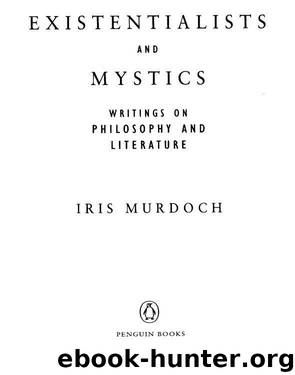Existentialists and Mystics by Iris Murdoch

Author:Iris Murdoch
Language: eng
Format: epub
Publisher: Penguin Publishing Group
Published: 2010-02-28T16:00:00+00:00
Essay in Yale Review, December 1959.
Against Dryness
The complaints which I wish to make are concerned primarily with prose, not with poetry, and primarily with novels, not with drama; and they are brief, simplified, abstract, and possibly insular. They are not to be construed as implying any precise picture of ‘the function of the writer’. It is the function of the writer to write the best book he knows how to write. These remarks have to do with the background to present-day literature, in Liberal democracies in general and Welfare States in particular, in a sense in which this must be the concern of any serious critic.
We live in a scientific and anti-metaphysical age in which the dogmas, images, and precepts of religion have lost much of their power. We have not recovered from two wars and the experience of Hitler. We are also the heirs of the Enlightenment, Romanticism, and the Liberal tradition. These are the elements of our dilemma: whose chief feature, in my view, is that we have been left with far too shallow and flimsy an idea of human personality. I shall explain this.
Philosophy, like the newspapers, is both the guide and the mirror of its age. Let us look quickly at Anglo-Saxon philosophy and at French philosophy and see what picture of human personality we can gain from these two depositories of wisdom. Upon Anglo-Saxon philosophy the two most profound influences have been Hume and Kant: and it is not difficult to see in the current philosophical conception of the person the work of these two great thinkers. This conception consists in the joining of a materialistic behaviourism with a dramatic view of the individual as a solitary will. These subtly give support to each other. From Hume through Bertrand Russell, with friendly help from mathematical logic and science, we derive the idea that reality is finally a quantity of material atoms and that significant discourse must relate itself directly or indirectly to reality so conceived. This position was most picturesquely summed up in Wittgenstein’s Tractatus. Recent philosophy, especially the later work of Wittgenstein and the work of Gilbert Ryle derivative therefrom, alters this a little. The atomic Humian picture is abandoned in favour of a type of conceptual analysis (in many ways admirable) which emphasises the structural dependence of concepts upon the public language in which they are framed. This analysis has important results in the philosophy of mind, where it issues in modified behaviourism. Roughly: my inner life, for me just as for others, is identifiable as existing only through the application to it of public concepts, concepts which can only be constructed on the basis of overt behaviour.
This is one side of the picture, the Humian and post-Humian side. On the other side, we derive from Kant, and also Hobbes and Bentham through John Stuart Mill, a picture of the individual as a free rational will. With the removal of Kant’s metaphysical background this individual is seen as alone. (He is in a certain sense alone on Kant’s view also, that is: not confronted with real dissimilar others.
Download
This site does not store any files on its server. We only index and link to content provided by other sites. Please contact the content providers to delete copyright contents if any and email us, we'll remove relevant links or contents immediately.
| Ancient & Classical | Arthurian Romance |
| Beat Generation | Feminist |
| Gothic & Romantic | LGBT |
| Medieval | Modern |
| Modernism | Postmodernism |
| Renaissance | Shakespeare |
| Surrealism | Victorian |
4 3 2 1: A Novel by Paul Auster(12391)
The handmaid's tale by Margaret Atwood(7763)
Giovanni's Room by James Baldwin(7346)
Asking the Right Questions: A Guide to Critical Thinking by M. Neil Browne & Stuart M. Keeley(5775)
Big Magic: Creative Living Beyond Fear by Elizabeth Gilbert(5771)
Ego Is the Enemy by Ryan Holiday(5447)
The Body: A Guide for Occupants by Bill Bryson(5096)
On Writing A Memoir of the Craft by Stephen King(4943)
Ken Follett - World without end by Ken Follett(4731)
Adulting by Kelly Williams Brown(4574)
Bluets by Maggie Nelson(4556)
Eat That Frog! by Brian Tracy(4538)
Guilty Pleasures by Laurell K Hamilton(4448)
The Poetry of Pablo Neruda by Pablo Neruda(4106)
Alive: The Story of the Andes Survivors by Piers Paul Read(4031)
White Noise - A Novel by Don DeLillo(4009)
Fingerprints of the Gods by Graham Hancock(4004)
The Book of Joy by Dalai Lama(3986)
The Bookshop by Penelope Fitzgerald(3852)
